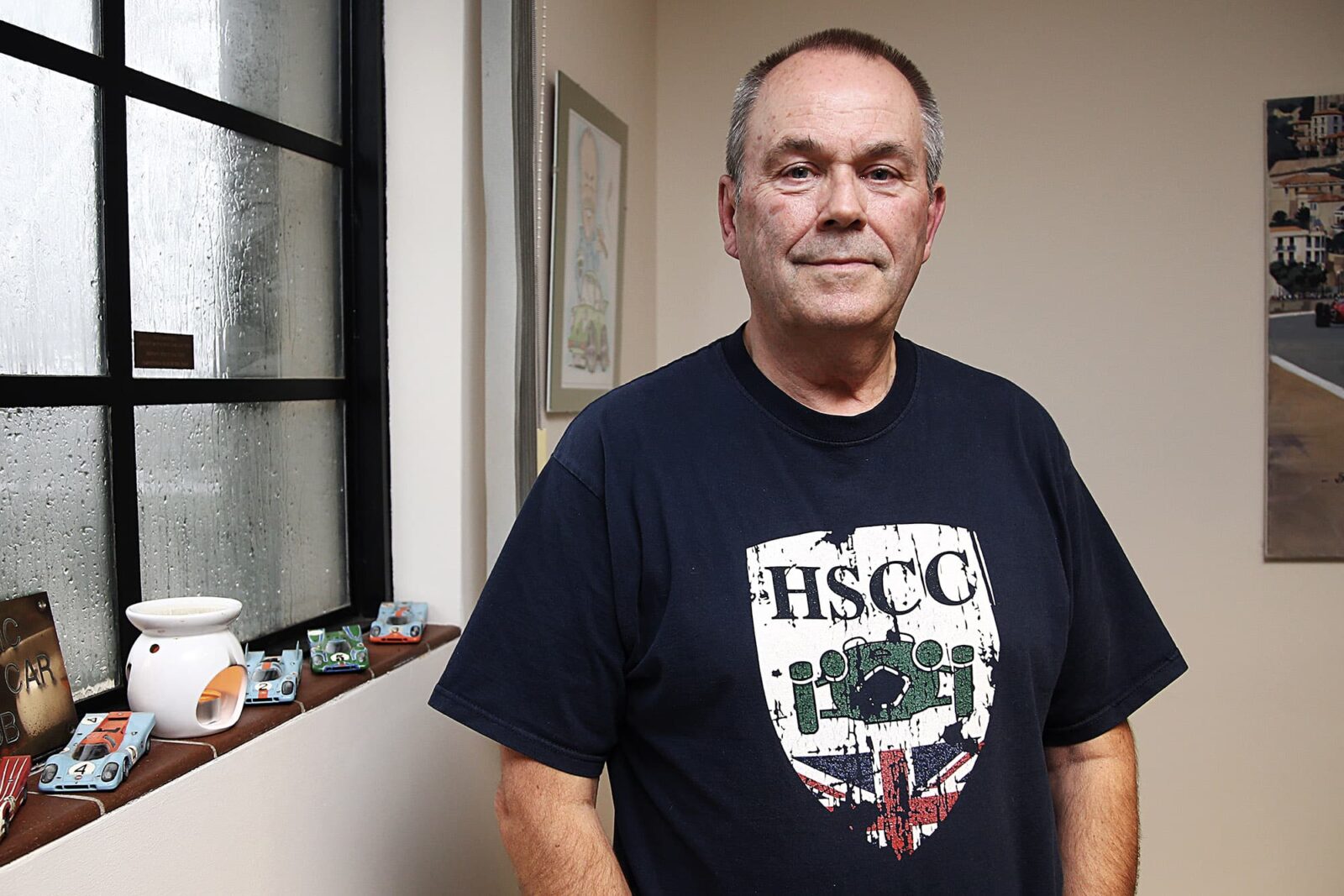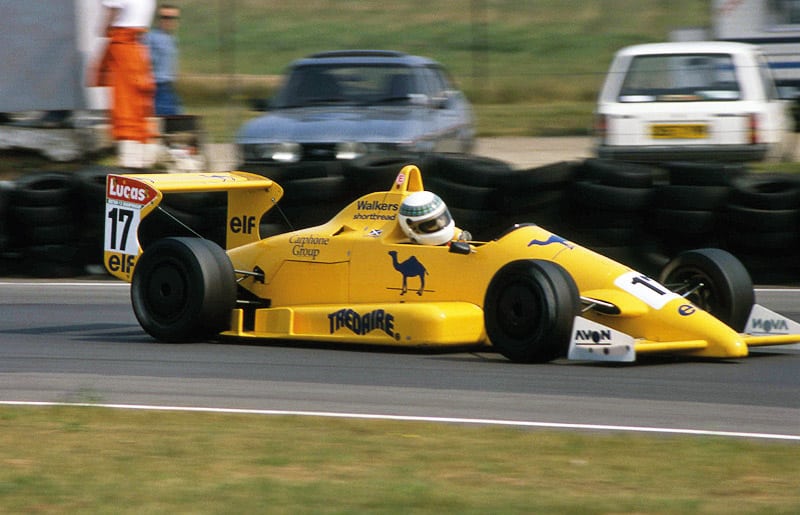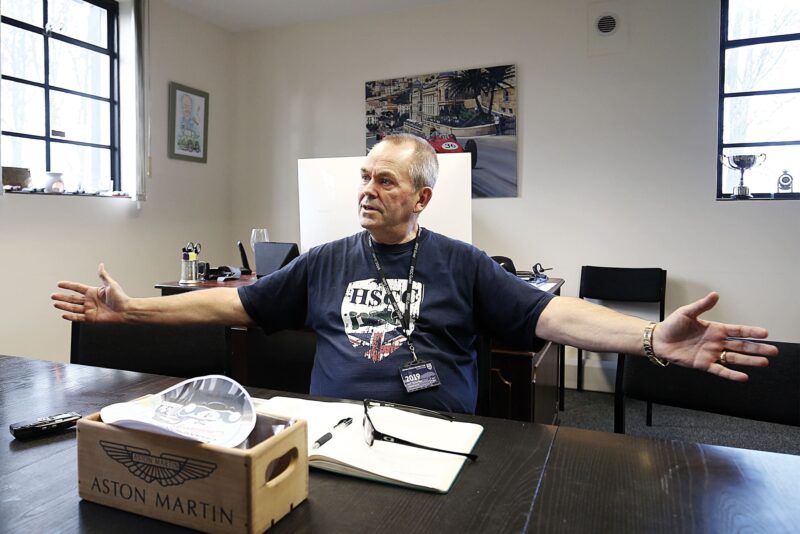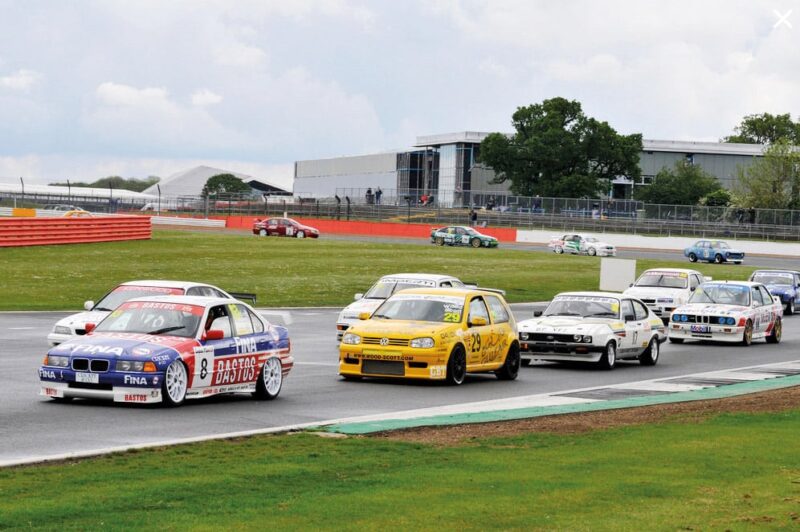Historic electric racing... Why not?
Andy Dee-Crowne has taken on a big role as the new boss of the Historic Sports Car Club and as Damien Smith discovers, he is a man plotting a bold course for its future

Andy Dee-Crowne has taken over from the popular Grahame White as HSCC CEO
Hoyer/JEP
You go through the door marked ‘Ladies’ when you visit the Historic Sports Car Club. Whatever you do, don’t walk straight ahead… Take a right-turn up the stairs. That’s where you’ll find the modest hub for one of Europe’s biggest, most prolific and well-established motor racing organisers.
The British Racing Drivers’ Club shower block next door to Silverstone’s old infield farm isn’t the obvious place to go searching for the HSCC, but it is suitably quirky, and somehow endearing, for a club that is at the heart of what’s best about British motor sport.

The HSCC has strong entry levels for the all-new Geoff Lees Trophy series for 1980s single-seaters
We’re here to meet CEO Andy Dee-Crowne, an HSCC racer himself and clerk of the course who accepted the job a little more than a year ago to replace the hugely popular Grahame White, now Honorary Life President. But Dee-Crowne isn’t the type to be overawed by such significant shoes. He’s ex-Navy, ex-police and a former government consultant for, among other things, the prison service. Ideal for dealing with temperamental drivers, then.
Dee-Crowne’s office is adorned with fantastic motor racing paintings, while Airfix Porsche 917s line up on the window sill. The HSCC T-shirt, which isn’t exactly straight from the packet, only reinforces the impression that here is a man with his priorities in order. The T-shirt is not for Motor Sport’s benefit, he insists, and we believe him. “The HSCC has always been my love and, when the position came up, I thought it was ideal for me,” he says. “I’m lucky to have got the job.”
“You have to define what ‘historic’ means, and it changes year by year”
He has inherited a club in decent health. Ahead of us lies another packed HSCC season of wonderful historic motor racing, from the big-on-prestige Silverstone International Trophy at Silverstone in May and the Oulton Park Gold Cup in August, to the charm of Cadwell Park in September and, for this year, humble Pembrey in June. The array of series remains close to all-encompassing, from perennial favourite Formula Ford to the burgeoning XL Aurora ‘libre’ series featuring Formula 5000s, and revived Thundersports for big-banger sports cars. The club will also travel to the Le Mans Classic for a Jaguar race in July and gets stretched all over Europe with its colourful grid of 1970s Formula 2s. With more than 1000 members to serve, most of whom race themselves, Dee-Crowne and competitions secretary Alan Jones cover a lot of ground on many weekends. “Our members come in all shapes and sizes,” says Dee-Crowne with a hint of a smile. “They are the club. I work for them, whatever they race.”

Wide-ranging plans: Dee-Crowne is aware the HSCC must become future-proof
Hoyer/JEP
His personal leanings are towards sports cars rather than single-seaters, but it’s Formula Ford he chooses as an example of what the HSCC does best. “We’re doing something big with Snetterton for Formula Ford, the Jim Russell Trophy Meeting on April 4-5,” he says. “Open-wheelers are not my first love, but I’ve grown to like FFord. It has a big following and attracts young people out of karts. I love that because we want younger people coming in. We might be a historic club, but it’s not just for historic people.”
Attracting new blood into motor sport is tough at every level and Dee-Crowne is quick to admit that it’s harder in the historic world, given the inevitable expense. But his open-arms attitude to youth also stretches to the age of racing cars the HSCC embraces. This year it’s launching a new series for 1980s single-seaters called the Geoff Lees Trophy, in deference to the 1981 European F2 champion, and a Production Car Challenge for 1980s touring, sports and GT cars. The Dunlop Saloon Car Cup is back on the rise with hopes of complex 1990s Super Tourers returning to the grids among Group 1 and Group A tin-tops.

HSCC’s Dunlop Saloon Car Cup provides a hit of nostalgia with original tourers in period liveries
“You have to define what ‘historic’ means, and it changes year by year,” says the CEO. “At our first meeting at Castle Combe back in 1966, we had a Jaguar D-type racing. At that time it was 10 years old. In today’s terminology it wouldn’t have been allowed to enter because it was too new…”
Dee-Crowne’s a pragmatist. On the headache of maintaining decent entries, his business background shows. “There are a lot of clubs all vying for the same members with the same cars – some might say too many,” he says. “Some might say Motorsport UK should take control of that, in terms of issuing [series] licences. But we are a service industry and people want to get bang for their buck, so what’s the differentiation they can get? That’s the bit I work on.
“There does seem to be a decline in motor sport. I wish I could put my finger on it. Are we going to experience the ‘Boris Bounce’? Was Brexit an issue? It probably was. Are car values an issue? I don’t know. You get those who set their entry fees high, but offer great hospitality; you get others who stack ’em high, sell ’em cheap; and you get us in the middle. I try to keep membership and entry fees as low as possible.”
Given his clerking background, safety is his priority. “The cars now are much safer than they were back in the day, but they are also a lot faster,” he points out. “The circuits are getting quicker, too. Take here at Silverstone, with its new surface. So, driving standards are the limiting factor. There is a variance in competence, and it is down to me and my clerks to make sure everyone is safe. It doesn’t have to be draconian, but it is about proactive work with driving standards observers and clerks. We work as a team, but it’s racing and accidents happen. You have to minimise it.”
“I can foresee us running an electric series. I don’t see why we wouldn’t.”
What about the longer term? What is motor racing’s future if the UK government follows through with its target for zero-emissions motoring in 2035? Dee-Crowne doesn’t pretend to have the answers.
“Am I concerned? You have to be,” he says. “Motor sport is not the ‘greenest’ of pastimes, but in terms of your carbon emissions, getting to and from a race meeting is more significant than what you do at a track. That said, I’m not complacent. We are doing simple things: how we dispose of waste at circuits, and we’re in negotiation with our fuel supplier to try to off-set carbon emissions.
“If we are going electric, where does the combustion engine fit in? If we have a different type of fuel, a synthetic fuel, and our cars can run on it we could go down that line. We don’t know where we are with that yet.
How about a historic Formula E series? “I can foresee us running an electric series. I don’t see why we wouldn’t,” he answers instantly. “We have to embrace everything. There’s an inevitability that you won’t be running huge V8s in 15-20 years’ time.”
A popular analogy for historic and club racing to cling on to is how steam railways still exist today, as a nostalgic indulgence.
“Do we have the critical mass to persuade government that we should be that special case?” says Dee-Crowne. “I’d like to think so, but who knows?”
Right now, he has more pressing matters, such as finalising what should be a fantastic meeting at Ireland’s Mondello Park called the Dublin Grand Prix, featuring “15-20 Formula 5000s” from the XL Aurora series… That sounds awesome. When there’s such fun to be had, the future and its foreboding storm clouds can wait.
